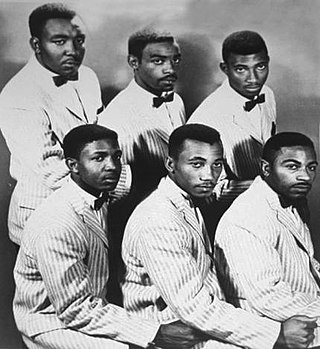Top Qs
Timeline
Chat
Perspective
Maurice Williams and the Zodiacs
American vocal group From Wikipedia, the free encyclopedia
Remove ads
Maurice Williams and the Zodiacs were an American doo-wop/R&B vocal group in the late 1950s and early 1960s. Originally the (Royal) Charms, the band changed its name to the Gladiolas in 1957 and the Excellos in 1958, before finally settling on the Zodiacs in 1959.[1]
This article needs additional citations for verification. (September 2007) |
Remove ads
Early history
Maurice Williams was born April 26, 1938, in Lancaster, South Carolina.[1] His first experience with music was in the church, where his mother and sister both performed. By the time he was six, Williams was performing regularly there. With his childhood friend Earl Gainey, Williams formed the gospel group the Junior Harmonizers. As rock and roll and doo-wop became their primary interest, the Junior Harmonizers changed their name to the Royal Charms.
Remove ads
The Royal Charms and the Gladiolas
In addition to Williams and Gainey, the Royal Charms were made up of Willie Jones (baritone), William Massey (tenor, baritone, trumpet), and Norman Wade (bass).[2] In the winter of 1956, while still in high school, Williams and his band traveled to Nashville, Tennessee, to record for the Excello label. At the time they were going by the name the Royal Charms, but the founder of Excello Records, Ernie Young, convinced them to change their name to the Gladiolas[3] (at the time, there were at least two other bands using the same name).
The song "Little Darlin'" was a No. 11 hit on the Billboard R&B chart in 1957,[4] but only reached number 41 on Billboard's Top 100.[5] However, when it was covered by the Canadian group the Diamonds, it moved up to No. 2.[6]
Remove ads
The Zodiacs
Summarize
Perspective
Williams finished high school and while on the road with the band, their station wagon broke down in Bluefield, West Virginia. The band came across a British-built Ford car known as the Zodiac and changed their name based on this.[3] Shortly thereafter, Henry Gaston replaced Earl Gainey.[2]
In the spring of 1959, Maurice Williams and the Zodiacs performed at the University of South Carolina in Columbia, South Carolina. Around that time, the group split and reformed. The members were Williams, Gaston, Wiley Bennett, and Charles Thomas. Later, Little Willie Morrow and Albert Hill were added.[2] One month later, in the early summer of 1959, the band recorded in a Quonset Hut on Shakespeare Road in Columbia. The recording engineer, Homer Fesperman, recorded several tracks that the band had hoped would include a hit. One of the last tracks that they recorded that day was "Stay",[2] a song that Williams had written in 1953. Williams sang lead and Henry Gaston sang the counter-verse falsetto.
After taking the demo of "Stay" to Al Silver at Herald Records in New York City, the song was pressed and released in early 1960. At 1:36, "Stay" is the shortest recording ever to reach number one on the Billboard Hot 100 chart in the United States.[7]
At the end of 1963, the British band the Hollies recorded "Stay",[2] which gave the group their debut Top Ten hit single in the UK, peaking at No.8[8] in January 1964, three years after the Zodiacs' version had peaked at No. 14 on the UK Singles Chart (January 1961). Later versions of "Stay", by the Four Seasons (1963) and Jackson Browne (1978),[2] reached the Top 20 in the U.S., each selling over one million copies in the United States alone. The inclusion of the Zodiacs' "Stay" on the soundtrack to the film Dirty Dancing in 1987 led to the song selling more records than it had during its original release.
A 1965 recording by the group, "May I", released by Vee Jay Records and Dee-Su Records, became, over the years, another million-selling record.[1]
Remove ads
Later life
Williams continued to record, tour, and release music until his death. He was inducted into the North Carolina Music Hall of Fame in 2010.[9] He also made several performances for the PBS "Doo Wop 50" show series in 2001.
Henry Gaston died on August 24, 2015, at the age of 79.[10][11] Maurice Williams died on August 6, 2024, at the age of 86.[12][13] Earl Gainey died on February 4, 2025, at the age of 87.[14]
Remove ads
Discography
Albums
- 1961 Stay
- 1965 At the Beach- Live in '65
- 1997 Let This Night Last, produced and arranged by Ron Oates
- 2000 The 21-song album, Back To Basics, was produced and arranged by Ron Oates in Nashville, Tennessee. It contains re-recorded versions of "Stay" and "Little Darlin".
Singles
Remove ads
See also
References
External links
Wikiwand - on
Seamless Wikipedia browsing. On steroids.
Remove ads

